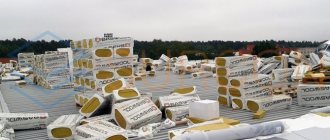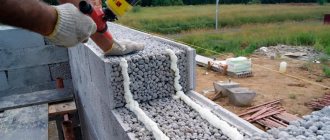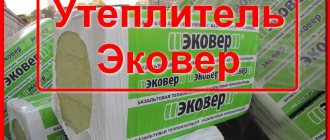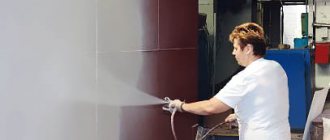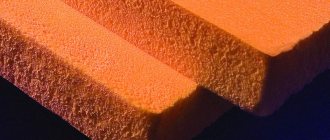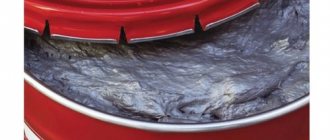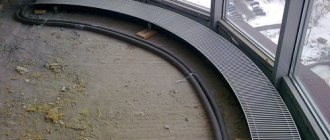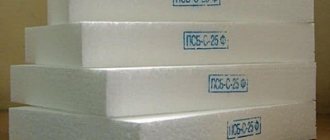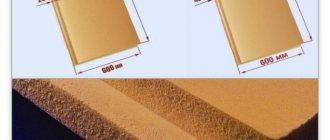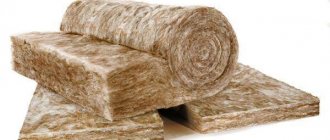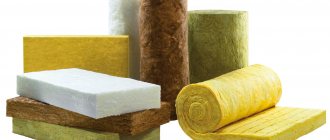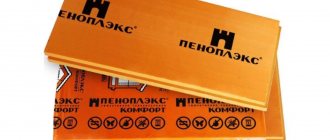Mineral wool BASWOOL Light
BASWOOL LIGHT is used in civil engineering as non-load-bearing heat and sound insulation of enclosing structures of all types of buildings: frame walls and partitions, pitched roof coverings, including mansard, interfloor and attic floors, floors, with insulation laid between the joists.
Prices are for orders in multiples of vehicles, excluding delivery costs.
| Name of product | Density, kg/m3 | Plate geometry, mm. | Package | Loading norm for a truck with a volume of m3 | Price including VAT RUR/m3 | ||||||||||||||||||||
| length Width | thickness in 10 mm increments | Thickness/number of slabs per pack | Pack volume, m3 | Pallet volume, m3 / number of packs | |||||||||||||||||||||
| 92 | 120 | ||||||||||||||||||||||||
| BASWOOL Light 30 general building thermal insulation | 30 | 1200 / 600 | 50-200 | 50 / 6 | 0.216 | 6.912 / 32 | 76.032 | 89.856 | On request | ||||||||||||||||
| 100 / 6 | 0.432 | ||||||||||||||||||||||||
| BASWOOL Light 35 general building thermal insulation | 35 | 50 / 12 | 0.432 | On request | |||||||||||||||||||||
| 100 / 6 | 0.432 | ||||||||||||||||||||||||
| BASWOOL Light 45 general building thermal insulation | 45 | 50 / 6 | 0.216 | On request | |||||||||||||||||||||
| 100 / 6 | 0.432 | ||||||||||||||||||||||||
Technical characteristics of Baswool Light mineral wool
Mineral wool BASWOOL Standard
Mineral wool BASWOOL Standard is used in civil engineering as unloaded heat and sound insulation of enclosing structures of all types of buildings: middle thermal insulation layer in walls partially or completely made of small-piece material, thermal insulation of frame walls, including external ones with various types of finishes, including siding.
Prices are for orders in multiples of vehicles, excluding delivery costs.
| Name of product | Density, kg/m3 | Plate geometry, mm. | Package | Loading norm for a truck with a volume of m3 | Price including VAT RUR/m3 | ||||||||||||||||||||
| length Width | thickness in 10 mm increments | Thickness/number of slabs per pack | Pack volume, m3 | Pallet volume, m3 / number of packs | |||||||||||||||||||||
| 92 | 120 | ||||||||||||||||||||||||
| BASWOOL Standard 50 thermal insulation of layered masonry | 50 | 1200 / 600 | 50-200 | 50 / 6 | 0.216 | 6.912 / 32 | 76.032 | 89.856 | On request | ||||||||||||||||
| 100 / 6 | 0.432 | ||||||||||||||||||||||||
| BASWOOL Standard 60 thermal insulation of layered masonry | 60 | 50 / 12 | 0.432 | On request | |||||||||||||||||||||
| 100 / 6 | 0.432 | ||||||||||||||||||||||||
| BASWOOL Standard 70 thermal insulation of layered masonry | 70 | 50 / 6 | 0.216 | On request | |||||||||||||||||||||
| 100 / 4 | 0.288 | ||||||||||||||||||||||||
Technical characteristics of mineral wool Baswool Standard
Mineral wool Baswool Flor
Mineral wool boards with a density of 100/120 kg/m3, which are used for insulating floors on the ground, floating floors and “warm floor” systems, as well as when laying concrete and cement screed on a heat-insulating layer.
Prices are for orders in multiples of vehicles, excluding delivery costs.
| Name of product | Density, kg/m3 | Plate geometry, mm. | Package | Loading norm for a truck with a volume of m3 | Price including VAT RUR/m3 | ||||||||||||||||||||
| length Width | thickness in 10 mm increments | Thickness/number of slabs per pack | Pack volume, m3 | Pallet volume, m3 / number of packs | |||||||||||||||||||||
| 92 | 120 | ||||||||||||||||||||||||
| BASWOOL FLOOR 100 thermal insulation of floors | 100 | 1200 / 600 | 50-150 | 50 / 6 | 0.216 | 6.048 / 28 | 66.528 | 78.624 | On request | ||||||||||||||||
| 100 / 3 | 6.912 / 32 | 76.032 | 89.856 | ||||||||||||||||||||||
| BASWOOL FLOOR 120 thermal insulation of floors | 120 | 50 / 6 | 6.912 / 32 | On request | |||||||||||||||||||||
| 100 / 3 | 6.912 / 24 | ||||||||||||||||||||||||
Technical characteristics of Baswool Flor mineral wool
Mineral wool Baswool Flor P
High-density insulation, which is used for thermal insulation of floors with increased load, including floors under screed for industrial premises.
Prices are for orders in multiples of vehicles, excluding delivery costs.
| Name of product | Density, kg/m3 | Plate geometry, mm. | Package | Loading norm for a truck with a volume of m3 | Price including VAT RUR/m3 | ||||||||||||||||||||
| length Width | thickness in 10 mm increments | Thickness/number of slabs per pack | Pack volume, m3 | Pallet volume, m3 / number of packs | |||||||||||||||||||||
| 92 | 120 | ||||||||||||||||||||||||
| BASWOOL FLOOR P 160 thermal insulation of floors with increased standards | 160 | 1200 / 600 | 30-50 | 50 / 4 | 0.144 | 6.912 / 48 | 76.032 | 89.856 | On request | ||||||||||||||||
| BASWOOL FLOOR P 180 thermal insulation of floors with increased standards | 180 | On request | |||||||||||||||||||||||
Technical characteristics of Baswool Flor P mineral wool
Mineral wool Baswool Vent Facade
Facade hydrophobized slabs with a density of 80-90 kg/m3. They are used as a heat-insulating layer for one- and two-layer insulation of walls with an external ventilated facade.
Prices are for orders in multiples of vehicles, excluding delivery costs.
| Name of product | Density, kg/m3 | Plate geometry, mm. | Package | Loading norm for a truck with a volume of m3 | Price including VAT RUR/m3 | ||||||||||||||||||||
| length Width | thickness in 10 mm increments | Thickness/number of slabs per pack | Pack volume, m3 | Pallet volume, m3 / number of packs | |||||||||||||||||||||
| 92 | 120 | ||||||||||||||||||||||||
| BASWOOL VENT FACADE 80 Ventilated facades | 80 | 1200 / 600 | 50-200 | 50 / 6 | 0.216 | 6.912 / 32 | 76.032 | 89.856 | On request | ||||||||||||||||
| 100 / 3 | |||||||||||||||||||||||||
| BASWOOL VENT FACADE 90 Ventilated facades | 90 | 50 / 6 | On request | ||||||||||||||||||||||
| 100 / 3 | |||||||||||||||||||||||||
Technical characteristics of Baswool Vent Facade mineral wool
Mineral wool Baswool Facade
High-density thermal insulation boards (up to 120-160 kg/m3). The insulation is intended for the outer heat-insulating layer for plastering.
Prices are for orders in multiples of vehicles, excluding delivery costs.
| Name of product | Density, kg/m3 | Plate geometry, mm. | Package | Loading norm for a truck with a volume of m3 | Price including VAT RUR/m3 | ||||||||||||||||||||
| length Width | thickness in 10 mm increments | Thickness/number of slabs per pack | Pack volume, m3 | Pallet volume, m3 / number of packs | |||||||||||||||||||||
| 92 | 120 | ||||||||||||||||||||||||
| BASWOOL FACADE 120 Thermal insulation of facades under plaster | 120 | 1200 / 600 | 50-160 | 50 / 6 | 0.216 | 6.912 / 32 | 76.032 | 89.856 | On request | ||||||||||||||||
| 100 / 3 | |||||||||||||||||||||||||
| BASWOOL FACADE 160 Thermal insulation of facades under plaster | 160 | 50 / 6 | On request | ||||||||||||||||||||||
| 100 / 3 | |||||||||||||||||||||||||
Technical characteristics of Baswool mineral wool Facade
Mineral wool Baswool Ruf N
hydrophobic slabs with a density of 100-120 kg/m3. Used as insulation (bottom layer) of flat roofs.
Prices are for orders in multiples of vehicles, excluding delivery costs.
| Name of product | Density, kg/m3 | Plate geometry, mm. | Package | Loading norm for a truck with a volume of m3 | Price including VAT RUR/m3 | ||||||||||||||||||||
| length Width | thickness in 10 mm increments | Thickness/number of slabs per pack | Pack volume, m3 | Pallet volume, m3 / number of packs | |||||||||||||||||||||
| 92 | 120 | ||||||||||||||||||||||||
| BASWOOL RUF N 100 bottom layer of flat roof thermal insulation | 100 | 1200 / 600 | 50-160 | 50 / 6 | 0.216 | 6.912 / 32 | 76.032 | 89.856 | On request | ||||||||||||||||
| 100 / 3 | |||||||||||||||||||||||||
| BASWOOL RUF N 110 bottom layer of flat roof thermal insulation | 110 | 50 / 6 | On request | ||||||||||||||||||||||
| 100 / 3 | |||||||||||||||||||||||||
| BASWOOL RUF N 120 bottom layer of flat roof thermal insulation | 120 | 50 / 6 | On request | ||||||||||||||||||||||
| 100 / 3 | |||||||||||||||||||||||||
Technical characteristics of Baswool Ruf N mineral wool
Mineral wool Baswool Ruf
Thermal insulation material with a density of 140 and 160 kg/m3, which is used for flat roofs with single-layer insulation.
Prices are for orders in multiples of vehicles, excluding delivery costs.
| Name of product | Density, kg/m3 | Plate geometry, mm. | Package | Loading norm for a truck with a volume of m3 | Price including VAT RUR/m3 | ||||||||||||||||||||
| length Width | thickness in 10 mm increments | Thickness/number of slabs per pack | Pack volume, m3 | Pallet volume, m3 / number of packs | |||||||||||||||||||||
| 92 | 120 | ||||||||||||||||||||||||
| BASWOOL ROOF 140 single-layer thermal insulation for flat roofs | 140 | 1200 / 600 | 50-200 | 50 / 6 | 0.216 | 6.912 / 32 | 76.032 | 89.856 | On request | ||||||||||||||||
| 100 / 2 | 0.144 | 6.912 / 48 | |||||||||||||||||||||||
| BASWOOL ROOF 160 single-layer thermal insulation for flat roofs | 160 | 50 / 6 | 0.216 | 6.912 / 32 | On request | ||||||||||||||||||||
| 100 / 2 | 0.144 | 6.912 / 48 | |||||||||||||||||||||||
Technical characteristics of Baswool Ruf mineral wool
Mineral wool Baswool Ruf V
Reinforced high-density mineral wool insulation (up to 190 kg/m3). Designed for insulating flat roofs as the top layer of thermal insulation.
Prices are for orders in multiples of vehicles, excluding delivery costs.
| Name of product | Density, kg/m3 | Plate geometry, mm. | Package | Loading norm for a truck with a volume of m3 | Price including VAT RUR/m3 | ||||||||||||||||||||
| length Width | thickness in 10 mm increments | Thickness/number of slabs per pack | Pack volume, m3 | Pallet volume, m3 / number of packs | |||||||||||||||||||||
| 92 | 120 | ||||||||||||||||||||||||
| BASWOOL ROOF B 170 top layer of thermal insulation for flat roofs | 170 | 1200 / 600 | 30-50 | 030 / 80 | 0.1728 | 6.912 / 40 | 76.032 | 89.856 | On request | ||||||||||||||||
| 40 / 5 | 0.144 | 6.912 / 48 | |||||||||||||||||||||||
| 50 / 4 | |||||||||||||||||||||||||
| BASWOOL ROOF B 180 top layer of thermal insulation for flat roofs | 180 | 030 / 80 | 0.1728 | 6.912 / 40 | 76.032 | 89.856 | On request | ||||||||||||||||||
| 40 / 5 | 0.144 | 6.912 / 48 | |||||||||||||||||||||||
| 50 / 4 | |||||||||||||||||||||||||
| BASWOOL ROOF B 190 top layer of thermal insulation for flat roofs | 190 | 40 / 5 | 6.336 / 44 | 69.696 | 82.368 | On request | |||||||||||||||||||
| 50 / 4 | 6.912 / 48 | 76.032 | 89.856 | ||||||||||||||||||||||
Technical characteristics of Baswool Ruf V mineral wool
Baswool mineral wool is a heat-insulating material that is used in the construction of houses: insulation of walls, facades, roofs. The main feature of this material is its versatility - it is suitable for insulating almost any walls and roofs and is therefore in great demand in all Russian regions.
Types of Baswool mineral wool
According to the existing classification of materials used in construction, Baswool brand mineral wool (also called basalt insulation) belongs to products made of stone, glass and slag. Accordingly, these materials are used in its production, and the types of mineral wool are called stone wool, glass wool and slag wool. Each type has its own characteristics:
- Stone wool is especially durable, can withstand any temperature - from low to high, and has increased resistance to vibration. It is produced in wide slabs - this adds convenience during its installation;
- Glass wool is an elastic material with low density and does not interact well with high temperatures. It is used in construction for insulating partitions in apartments and houses; it insulates well, but does not withstand physical stress well - therefore it is not used for insulating the facades of houses;
- Slag wool - has almost the same characteristics as stone mineral wool, and is used in the same cases.
The density of Baswool mineral wool can range from 30 to 180 kg per cubic meter. The density is selected based on the intended use of the insulation. To insulate the facade, mineral wool with a density of 135 kg/m3 is used. For the first layer in a roofing pie - from 100 kg/m3, for the top layer - from 175 kg/m3. When using single-layer thermal insulation, the permissible density is from 140 kg/m3.
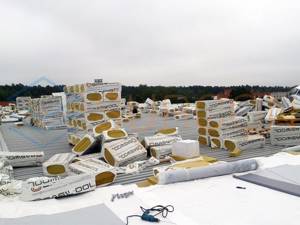
Mineral wool Baswool Ruf
| Name of product | Density, kg/m3 | Plate geometry, mm. | Package | Loading norm for a truck with a volume of m3 | Price including VAT ₽/m3 | ||||||||||||||||||||
| length Width | thickness in 10 mm increments | Thickness/number of slabs per pack | Pack volume, m3 | Pallet volume, m3 / number of packs | |||||||||||||||||||||
| 92 | 120 | ||||||||||||||||||||||||
| BASWOOL ROOF 140 single-layer thermal insulation for flat roofs | 140 | 1200 / 600 | 50-200 | 50 / 6 | 0.216 | 6.912 / 32 | 76.032 | 89.856 | On request | ||||||||||||||||
| 100 / 2 | 0.144 | 6.912 / 48 | |||||||||||||||||||||||
| BASWOOL ROOF 160 single-layer thermal insulation for flat roofs | 160 | 50 / 6 | 0.216 | 6.912 / 32 | On request | ||||||||||||||||||||
| 100 / 2 | 0.144 | 6.912 / 48 | |||||||||||||||||||||||
Detailed characteristics of the material
Basvul is a high-quality mineral wool made from basalt rocks. She is one of the brightest representatives in her segment.
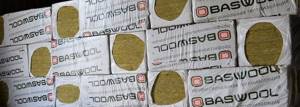
Main features and differences from competitors
Popularity comes to a particular brand only if it has a considerable amount of advantages. The trend was confirmed this time too. Basvul is characterized by the following advantages:
- Variability of use. It can be used for both interior and exterior work (depending on the type).
- High temperature resistance, class NG (non-flammable substances). This is one of the few brands of mineral wool that can boast of this. Fire resistance is achieved due to the presence of stone fibers that prevent combustion.
- High noise absorption rate. When using insulation on the roof, it dampens up to 80% of noise and vibrations. As a result, no drops of rain or hail can be heard.
- Low (no more than 1%) water absorption coefficient. Therefore, this material can be used in rooms with high humidity (bath, kitchen, etc.).
- Absolute absence of shrinkage, even over time the wool does not deform.
- Relatively light weight.
- Absolute resistance to natural irritants: fungus, mold, etc. As a result, the material never rots, even in conditions of high humidity.
- Ease of installation. Basvul is sold in small rolls that are easy to roll and cut. Therefore, installation comes down to simple operations that anyone can handle with their own hands.
- As a consequence of the above advantages, the operational period is up to 50 years.
Moreover, the prices of this brand are significantly lower than those of foreign analogues (Knauf. RockWool, Isover, etc.) by an average of 20-30%. A competent pricing policy has become one of the main drivers of the success of this domestic manufacturer.
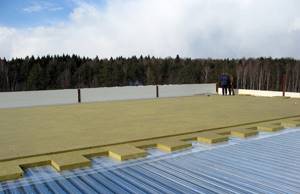
All known varieties
There are several types of Basvul thermal insulation, which differ in basic technical characteristics. For clarity, all data is presented in table form.
| Characteristic | Type of insulation | ||||
| Light | Standard | Facade | Vent. Facade | Rufus | |
| Density (kg/m3) | 35-45 | 50-60 | 140-160 | 80-90 | 110-190 |
| Thermal conductivity index (W/m*C) | 0,35-0,4 | ||||
| Vapor permeability (m*h*Pa) | 0,3-0,31 | ||||
| Water absorption (% of volume) | 1-1,5 | ||||
| Flammability class | NG (non-flammable material) | ||||
| Organic content (%) | 2,5 | 3 | 4,5 | 3,5 | 4-4,5 |
The technical characteristics presented above are regulated by TU 5762-001-80015406-2010. The product is certified. More detailed information can be obtained here - https://www.baswool.ru/assets/images/promotion/baswool.pdf
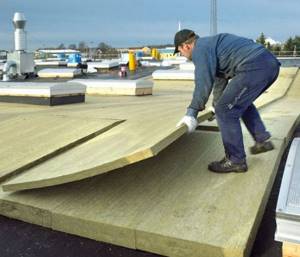
Mineral wool Baswool Ruf V
| Name of product | Density, kg/m3 | Plate geometry, mm. | Package | Loading norm for a truck with a volume of m3 | Price including VAT ₽/m3 | ||||||||||||||||||||
| length Width | thickness in 10 mm increments | Thickness/number of slabs per pack | Pack volume, m3 | Pallet volume, m3 / number of packs | |||||||||||||||||||||
| 92 | 120 | ||||||||||||||||||||||||
| BASWOOL ROOF B 170 top layer of thermal insulation for flat roofs | 170 | 1200 / 600 | 30-50 | 030 / 80 | 0.1728 | 6.912 / 40 | 76.032 | 89.856 | 6500.00 | ||||||||||||||||
| 40 / 5 | 0.144 | 6.912 / 48 | |||||||||||||||||||||||
| 50 / 4 | |||||||||||||||||||||||||
| BASWOOL ROOF B 180 top layer of thermal insulation for flat roofs | 180 | 030 / 80 | 0.1728 | 6.912 / 40 | 76.032 | 89.856 | On request | ||||||||||||||||||
| 40 / 5 | 0.144 | 6.912 / 48 | |||||||||||||||||||||||
| 50 / 4 | |||||||||||||||||||||||||
| BASWOOL ROOF B 190 top layer of thermal insulation for flat roofs | 190 | 40 / 5 | 6.336 / 44 | 69.696 | 82.368 | On request | |||||||||||||||||||
| 50 / 4 | 6.912 / 48 | 76.032 | 89.856 | ||||||||||||||||||||||
What are the varieties?
Each insulation product has a wide selection of models used in different areas of insulation. The same can be said about Basvul.
Baswool Light 45
The parameters and features of Basvul Light 45 allow it to be used for insulating frame walls, interior plasterboard partitions, roofs, interfloor slabs, and attics. You can also insulate floors with it by laying it between the joists.
It is produced in slabs with a density of 30-50 kg/m 3. There are different models of Light insulation 30, 35, 45. The number indicates the density of the material.
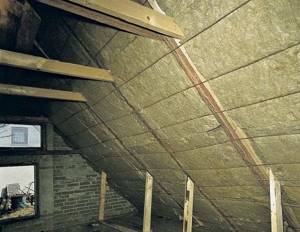
Roof thermal insulation
Baswool Facade
It is produced in slabs with a density of 110-160 kg/m 3. This building material is used for façade insulation, followed by plastering and decorative finishing. Speaking about the properties of Basvul Facade, we can note the thermal conductivity of 0.036-0.040 W/(m*K), peel strength 15-21 kPa (the indicator depends on the density, the higher it is, the greater the peel strength).
Baswool Vent Facade
It is produced in slabs with a density of 80, 90 kg/m 3.
These two models have compressive strengths of 17 and 20 kPa, respectively. Layer peel strength is 6.8 kPa. Water absorption by volume is 1.5%. Corresponding to the entire model range.
Basvul Vent Facade is considered non-flammable and prevents the spread of fire.
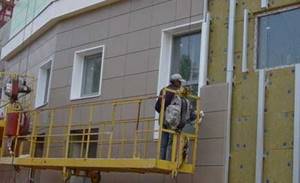
Thermal insulation of the facade
Baswool Standard
This model is available in slabs of different densities - 50, 60, 70 kg/m3. It is used as a layer in a wall made of small-piece material. It is used for frame insulation indoors and outside the building. The Baswool facade insulation standard does not require plastering of the slabs. This option is intended before finishing with siding.
Basvul Standard absorbs no more than 1.5% moisture (volume percentage). The thickness of the slabs varies from 3 to 20 cm.
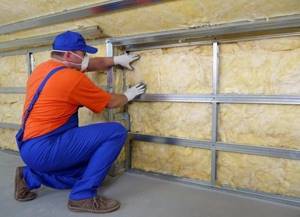
Frame insulation
Baswool Flor
It is manufactured for floor insulation. It can be laid under the screed of a floating structure. It is also used for heated floors. Basvul Flor has soundproofing qualities. Density - 100-120 kg/m3.
Mineral wool Baswool Vent Facade
| Name of product | Density, kg/m3 | Plate geometry, mm. | Package | Loading norm for a truck with a volume of m3 | Price including VAT ₽/m3 | ||||||||||||||||||||
| length Width | thickness in 10 mm increments | Thickness/number of slabs per pack | Pack volume, m3 | Pallet volume, m3 / number of packs | |||||||||||||||||||||
| 92 | 120 | ||||||||||||||||||||||||
| BASWOOL VENT FACADE 80 Ventilated facades | 80 | 1200 / 600 | 50-200 | 50 / 6 | 0.216 | 6.912 / 32 | 76.032 | 89.856 | 3450.00 | ||||||||||||||||
| 100 / 3 | |||||||||||||||||||||||||
| BASWOOL VENT FACADE 90 Ventilated facades | 90 | 50 / 6 | 3750.00 | ||||||||||||||||||||||
| 100 / 3 | |||||||||||||||||||||||||
What is Baswul?
Baswool insulation
Stone wool is made from basalt rocks. To obtain this fiber, raw materials are processed at temperatures above 1000°C. The individual parts are held together with organic resins. Basvul is produced at a modern plant in Blagoveshchensk near Ufa. The first batches of insulation were released in the summer of 2011.
This basalt wool is used in the processing of private buildings, outbuildings, as well as industrial institutions. The price is affordable, so even those who do not have the means to use expensive building materials can carry out thermal insulation work using this insulation.
Features of mineral wool slabs under the Baswool brand
Mineral wool slabs are made from natural raw materials (basalt rocks) using a synthetic binder. However, the quality of the latter is so high, and the production technology is so strictly observed that the finished material is safe for humans.
Basalt insulation has high strength, durability, and a special structure that causes its low thermal conductivity. Basvul slabs do not support combustion at temperatures up to 1000°C, and do not deform under the influence of fire. They can act as a sound-absorbing material and an additional waterproofing layer. Insulation materials are not attractive to fungi, rodents, harmful microorganisms, and insects.
Types and characteristics of Baswool insulation
Basvul stone wool with high density.
Basvul insulation is manufactured at, which is located near the capital of Bashkortostan, the city of Ufa. The company produces various thermal insulation materials:
- glass wool;
- stone wool;
- extruded polystyrene foam;
- fire protection
All products are manufactured using the latest Slovenian-made equipment. Baswool insulation is used for all thermal insulation work, both in civil and industrial facilities. Mineral wool insulation has gained the most popularity.
Thanks to the fairly democratic pricing policy of the management of the Agidel LLC holding, the cost of the product in the retail network is more than moderate. At the same time, there is plenty to choose from in the Basvul insulation line. Conventionally, all materials can be divided into groups:
- for roofing;
- for horizontal floors;
- for walls.
Different operating conditions are undoubtedly taken into account in the characteristics of each material.
How to buy Baswool mineral wool
The easiest way to buy Baswool mineral wool is to contact. Our specialists will always help you choose the type of insulation that will meet all the needs of the project. For the convenience of our clients, we provide installation services for PVC membranes in Kaluga and the Kaluga region.
In the “Contacts” section of the website you can always find up-to-date information about the company’s data. A professional team is engaged in the installation of roofs of any complexity. By clicking on the “Call Back” button, you can leave your contact information, using which the manager will contact you at any convenient time.
Basvul mineral wool, what’s so warm about it?
Stone or mineral slabs in their name do not carry heat, but if you pay attention to the fibrous structure of the material, it immediately becomes clear that heat is retained in it perfectly!
Buying Basvul insulation is an excellent solution for a private one-story house or for commercial construction. For this purpose, the material has a whole list of advantages, the main of which are:
- Environmental friendliness: fiber for boards is obtained from molten basalt rocks;
- Durability: the service life of the insulation exceeds 50 years;
- Hydrophobic impregnation: water absorption even with complete immersion is no more than 1.0 kg/m3;
- Non-flammable material: does not smoke on an open fire and prevents the spread of fire;
- Low thermal conductivity: heating up to 750 degrees on one side of the stove will feel like a comfortable 20 degrees on the opposite side;
- Thermal insulation with Basvul slabs supports the natural breathing of the house, removing excess moisture through the walls.
To maintain thermal insulation properties, it is recommended to use wind and vapor barriers, which will maintain moisture removal and protect the mineral wool. The springy material Baswool fits perfectly into the frame of guide profiles, covers the surface and is fixed even in steep areas.
The light weight and high economic performance of Basvul insulation, the price of which is significantly lower than that of foreign analogues with similar characteristics, makes the domestic manufacturer one of the sales leaders. In terms of performance characteristics, Penoplex brand polystyrene foam can be compared with Baswool stone wool.
Baswool mineral wool for walls
Stone wool is used indoors and outdoors.
In the line of thermal insulation materials for walls, it produces the following types of insulation:
- Light;
- Standard;
- Ventilated façade;
- Facade;
- Sandwich S.
The main difference between all these materials is their density, which cannot but affect thermal conductivity. The higher the density of the material, the worse it works as thermal insulation. Basful Standard has a density of 70 kg/m. cube, while Ventfacade is already 90 kg/m. cube The heaviest and densest material is Baswool Facade mineral wool, which weighs 160 kg/m. cube This is necessary so that it is possible to implement insulation of external walls using the wet facade method.
Sandwich C is used in the production of insulating panels for walls. Compared to Sandwich K (for the roof), it has a lower density, which is 110 kg/m. cube This is quite enough, since the load on the walls is much less than on the roof.
Mineral wool Baswool Facade
| Name of product | Density, kg/m3 | Plate geometry, mm. | Package | Loading norm for a truck with a volume of m3 | Price including VAT ₽/m3 | ||||||||||||||||||||
| length Width | thickness in 10 mm increments | Thickness/number of slabs per pack | Pack volume, m3 | Pallet volume, m3 / number of packs | |||||||||||||||||||||
| 92 | 120 | ||||||||||||||||||||||||
| BASWOOL FACADE 120 Thermal insulation of facades under plaster | 120 | 1200 / 600 | 50-160 | 50 / 6 | 0.216 | 6.912 / 32 | 76.032 | 89.856 | 5450.00 | ||||||||||||||||
| 100 / 3 | |||||||||||||||||||||||||
| BASWOOL FACADE 160 Thermal insulation of facades under plaster | 160 | 50 / 6 | On request | ||||||||||||||||||||||
| 100 / 3 | |||||||||||||||||||||||||
Universal insulation - from floor to roof
Baswool universal mineral wool boards are widely used for thermal insulation:
- interfloor ceilings, floors along logs;
- internal partitions;
- walls of frame buildings;
- pitched roofs (attic, attic).
The following names belong to the category of universal insulation: Ecorock 30, Baswool Light 35, Baswool Light 45. They are united not only by the scope of application, but also by average technical characteristics.
- The thermal conductivity coefficient at 10°C is 0.035-0.037 W/m·K. At a temperature of 25°C it increases to 0.038-0.039 W/m·K.
- Density – 30-45 kg/m3. These are relatively low values.
- Water absorption does not exceed 2%.
All Basvul universal insulation materials are lightweight and resistant to chemicals. They are presented on the company’s official website, where you can buy them after reading the characteristics in more detail.
Mineral wool Baswool Flor
| Name of product | Density, kg/m3 | Plate geometry, mm. | Package | Loading norm for a truck with a volume of m3 | Price including VAT ₽/m3 | ||||||||||||||||||||
| length Width | thickness in 10 mm increments | Thickness/number of slabs per pack | Pack volume, m3 | Pallet volume, m3 / number of packs | |||||||||||||||||||||
| 92 | 120 | ||||||||||||||||||||||||
| BASWOOL FLOOR 100 thermal insulation of floors | 100 | 1200 / 600 | 50-150 | 50 / 6 | 0.216 | 6.048 / 28 | 66.528 | 78.624 | 4250.00 | ||||||||||||||||
| 100 / 3 | 6.912 / 32 | 76.032 | 89.856 | ||||||||||||||||||||||
| BASWOOL FLOOR 120 thermal insulation of floors | 120 | 50 / 6 | 6.912 / 32 | On request | |||||||||||||||||||||
| 100 / 3 | 6.912 / 24 | ||||||||||||||||||||||||
Description and main characteristics
Baswool mineral wool is produced by Agidel LLC, one of the leaders in the production of thermal insulation materials. The insulation described in the article can be used for insulation:
- walls;
- roofs;
- floor (interfloor ceilings).
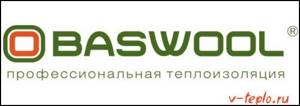
The material can be used equally effectively both in private construction and in the construction of industrial facilities. It is made from molten rock - basalt - at a temperature of a thousand degrees. It is thanks to this production technology that the insulation received its exceptional characteristics. Let's look at them.
- The weight of this heat insulator can vary between 25 and 225 kilograms per cubic meter.
- The moisture absorption rate does not exceed 1 percent of the total weight, as well as 2 percent of its volume.
- Thermal conductivity, as a rule, does not exceed 0.038 Watt/m*K.
- Basvul has high vapor permeability - at least 0.3 milligrams/(h*m*Pa).
- The standard dimensions of insulation boards are as follows (WxLxH) - 600x1200x30-200 millimeters.
- Finally, in terms of its flammability it belongs to class A1.
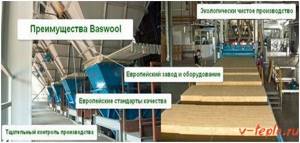
Now let’s take a look at the advantages of Baswool heat insulation and how exactly it differs from competing insulation materials.
Strengths of Basvul heat insulator
As we noted above, the basalt wool described in the article has numerous advantages, thanks to which it has gained enormous popularity. Let's consider the advantages of insulation in more detail.
- It has excellent noise and thermal insulation properties.
- It weighs little, which means installation is not particularly difficult.
- The vapor permeability of the insulation is quite high, and therefore the most comfortable microclimate is maintained in the insulated room.
- The material is easy to install.
- It is environmentally friendly, and despite the fact that its service life is practically unlimited.
- During the entire period of operation in buildings, neither the dimensions nor the properties of the material change.
- Insulation shrinkage is minimal.
- Finally, it is hygroscopic.
What operating parameters determine the popularity of this type of insulation?
- Mineral wool is a product of processing environmentally friendly natural raw materials, basalt rocks. The binder composition contains no phenol-forming components.
- Basvul panels are characterized by low thermal conductivity, are vapor permeable, and are highly resistant to aggressive chemical compounds and high-temperature influences.
- The structure of the material is hydrophobized, so the amount of moisture in the insulation does not exceed 1% of the total volume. This provides the panels with proper heat retention in a waterlogged environment.
- The geometric dimensions of the panels are maintained with high precision, which has a positive effect on the quality and productivity of installation.
- The thickness of the insulation ranges from 20 to 200 mm, which greatly simplifies the selection depending on the technical requirements.
- The insulation density of the Standard model corresponds to 45 kg/m3, this indicator allows the material to be used for finishing old building structures or those that do not have the required safety factor. Even a fairly thick coating does not create loads on walls and foundations.
Manufacturers supply their products with durable and airtight shrink packaging. This simplifies the transportation and storage of panels in adverse weather conditions.
Specifications
| Density, kg/m3 | 50…70 |
| Compressibility, % no more | 10 |
| Thermal conductivity at 10 0 C, W/(m*K), no more | 0,035 |
| Thermal conductivity at 25 0 C, W/(m*K), no more | 0,038 |
| Thermal conductivity under operating conditions A, W/(m*K), no more | 0,042 |
| Thermal conductivity under operating conditions B, W/(m*K), no more | 0,045 |
| Vapor permeability, mg/(m*h*Pa) not less | 0,3 |
| Water absorption by mass, kg/m2, no more | 1,0 |
| Water absorption by volume, %, no more | 1,5 |
| Content of organic substances by weight, %, no more | 3,0 |
| Flammability degree | NG |
Special thermal insulation - types and features
Special thermal insulation is intended for insulation of individual structures. It is developed taking into account operating conditions and possible load.
Thermal insulation Basvul for flat roofing
A flat roof experiences much greater loads than a pitched roof. For this reason, it requires thermal insulation with increased compressive strength and density. This is exactly what the manufacturer produces under the Baswool brand.
- Baswool RUF. Designed for single-layer insulation under a cement screed or without it. Material density is 140 or 160 kg/m3, strength is 50 and 60 kPa.
- Baswool RUF N – mineral wool boards with low thermal conductivity for the bottom layer of thermal insulation. Their density is 100-120 kg/m3, strength is 35-45 kPa.
- Baswool RUF V is the top layer of insulation when installing two-layer insulation. It has the highest density in the presented line - 170-190 kg/m3 and strength - 65-80 kPa.
All three types of basalt slabs are characterized by reduced water absorption - no more than 1.5%.
Basalt slabs for floor insulation
High-quality floor insulation not only reduces heat loss, but also creates a comfortable microclimate in the room. For effective thermal insulation, you need especially durable, moisture-resistant, dense slabs with increased noise absorption.
Baswool offers the consumer two types of materials with suitable characteristics: Baswool Floor, Baswool Floor P. They are designed for constructing various floors:
- "floating";
- warm;
- under the screed along a layer of thermal insulation;
- interfloor ceilings;
- over an unheated basement.
Please note: Basvul Flor P insulation can withstand much greater loads than Basvul Flor. It can even be used to insulate floors in industrial premises
Specifications:
- Baswool Floor has a density of at least 100 kg/m3 and a strength of at least 30 kPa. The thermal conductivity coefficient at 10°C does not exceed 0.035 W/m·K, and at 25°C – 0.037 W/m·K.
- Baswool Floor P can withstand a load of 160-180 kg per 1 m3 with a compressive strength of 50-55 kPa. The thermal conductivity coefficient, depending on the temperature regime, ranges from 0.037-0.040 W/m·K.
Heat and sound insulation floor slabs are resistant to moisture and shrinkage.
Thermal insulation of external walls (facade)
The manufacturer's product range includes several types of mineral wool slabs for insulating external walls.
- Basvul Facade is designed for single-layer thermal insulation of facades for their subsequent plastering. It has increased density (110-160 kg/m3), strength, low water absorption (less than 1%).
- Basvul Vent Facade is suitable for installing a ventilation façade. Most often it is used as external insulation with two-layer thermal insulation. The density of such mineral wool slabs can be 80 or 90 kg/m3, which is marked accordingly in the form of a number. Their water absorption does not exceed 1.5%, and the thermal conductivity coefficient at 10°C is maximum at 0.035 W/m K.
- Basvul Standard slabs with a density of 50, 60 and 70 kg/m3 are an option for insulating frame external walls and facades under small-piece finishing materials. This can be siding, block house, etc. The thermal conductivity coefficient, vapor permeability and water absorption are the same as those of Basvul Vent Facade.
The roof, walls, and floors have a large area, so without proper insulation, heat loss through them can be large. Baswool thermal insulation helps to effectively prevent them by creating a comfortable microclimate inside the building.
Mineral wool Baswool Flor P
| Name of product | Density, kg/m3 | Plate geometry, mm. | Package | Loading norm for a truck with a volume of m3 | Price including VAT ₽/m3 | ||||||||||||||||||||
| length Width | thickness in 10 mm increments | Thickness/number of slabs per pack | Pack volume, m3 | Pallet volume, m3 / number of packs | |||||||||||||||||||||
| 92 | 120 | ||||||||||||||||||||||||
| BASWOOL FLOOR P 160 thermal insulation of floors with increased standards | 160 | 1200 / 600 | 30-50 | 50 / 4 | 0.144 | 6.912 / 48 | 76.032 | 89.856 | On request | ||||||||||||||||
| BASWOOL FLOOR P 180 thermal insulation of floors with increased standards | 180 | On request | |||||||||||||||||||||||
Insulation of floors (floors)
All work begins with dismantling the floor covering. If the floor covering is going to be reused, it must be removed very carefully. In this case, it is advisable to mark with chalk where a particular fragment lay.
Leveling the base
The floor surface must be leveled. This will greatly facilitate the subsequent steps and increase the comfort of being in the room. Most often the screed is poured. However, with minor fluctuations in the surface, you can resort to other methods of leveling the base, depending on the type of floor, as well as financial capabilities.
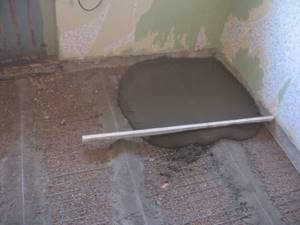
If the base has not been properly prepared, cracks and crevices may form in it during subsequent use. As a result, the floor will be cold.
Laying vapor barrier and installing logs
After leveling the base, a layer of vapor barrier is laid. The material should be selected taking into account the operating characteristics of a particular room. Laying must be done with an overlap on the walls. The overlap should be proportional to the size of the joists.
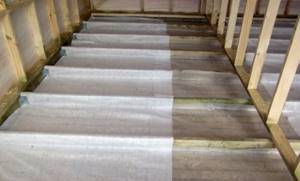
The installation of the logs should be carried out taking into account the uniformity of the applied load. The optimal distance is considered to be about 90 cm. When choosing the size of the log, you should focus on the total area of the room and the size of the heat-insulating material used. The logs must be securely fastened in the selected places.
Installation of insulation
Mineral wool should be cut according to the size of the grooves formed between the joists and placed in the available space. The thermal insulation material should fit very tightly to the joists. The presence of gaps is unacceptable. To do this, each piece of insulation should be taken a centimeter wider than the width of the groove.
Waterproofing, finished floor
Waterproofing is laid on the insulation layer. Its characteristics must be fully consistent with the characteristics of the room for which it is purchased.
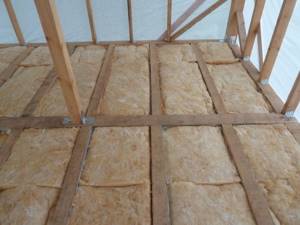
Installation of a finished floor begins with attaching a durable material to the joists that can absorb and evenly distribute the load. For this purpose, you can purchase regular boards, as well as special drywall, plywood, chipboard or fiberboard. The selected coating is laid on top of it.
Description and main characteristics
Baswool mineral wool is produced by Agidel LLC, one of the leaders in the production of thermal insulation materials. The insulation described in the article can be used for insulation:
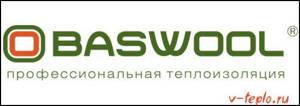
The material can be used equally effectively both in private construction and in the construction of industrial facilities. It is made from molten rock - basalt - at a temperature of a thousand degrees. It is thanks to this production technology that the insulation received its exceptional characteristics. Let's look at them.
- The weight of this heat insulator can vary between 25 and 225 kilograms per cubic meter.
- The moisture absorption rate does not exceed 1 percent of the total weight, as well as 2 percent of its volume.
- Thermal conductivity, as a rule, does not exceed 0.038 Watt/m*K.
- Basvul has high vapor permeability - at least 0.3 milligrams/(h*m*Pa).
- The standard dimensions of insulation boards are as follows (WxLxH) - 600x1200x30-200 millimeters.
- Finally, in terms of its flammability it belongs to class A1.
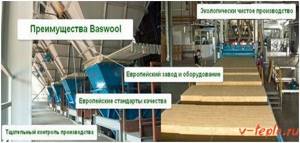
Now let’s take a look at the advantages of Baswool heat insulation and how exactly it differs from competing insulation materials.
Strengths of Basvul heat insulator
As we noted above, the basalt wool described in the article has numerous advantages, thanks to which it has gained enormous popularity. Let's consider the advantages of insulation in more detail.
- It has excellent noise and thermal insulation properties.
- It weighs little, which means installation is not particularly difficult.
- The vapor permeability of the insulation is quite high, and therefore the most comfortable microclimate is maintained in the insulated room.
- The material is easy to install.
- It is environmentally friendly, and despite the fact that its service life is practically unlimited.
- During the entire period of operation in buildings, neither the dimensions nor the properties of the material change.
- Insulation shrinkage is minimal.
- Finally, it is hygroscopic.
In addition, Basvul insulation is a representative of the class of non-combustible materials; it fully complies with all fire safety standards and can even be used as fire protection in appropriate fences.
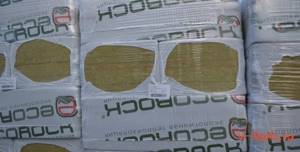
Note! The manufacturing company produces and sells a fairly wide range of mineral wool slabs for insulation, from the lightest (about 25 kilograms per cubic meter) to the heavy ones (up to 225 kilograms). Video – Basalt wool Basvul
Video – Basalt wool Basvul
Thanks to the characteristics listed above, Basvul compares favorably with other thermal insulation materials. The table below shows the comparative characteristics of the described insulation and its closest “competitors,” that is, EPS and polystyrene foam.
Table. Comparison of insulation materials
Parameter name
Thermal insulator
Baswul
Styrofoam
Extruded polystyrene foam
Among the many thermal insulation materials, mineral wool products have an advantage when it comes to fire safety issues. One of them is Baswul. It is used when performing a variety of types of thermal insulation work. There are different types of this building material: Basvul Light, Standard, Flor P, ECOROCK, Basvul Vent Facade, as well as others, the technical characteristics of which indicate high quality products.
Characteristics of the material "Basvul Facade"
Increasingly recently, consumers are choosing Basvul products. Facade insulation can be used for thermal insulation of external walls, onto which decorative plasters are subsequently applied. Standard sheets are limited to a thickness of 4 to 16 cm, and the density varies between 135–175 kg/m3. Compressive strength is equivalent to 45 kPa, water absorption is minimal and does not reach 1%. The content of organic substances is less than 4.5%. Due to the fact that the material is not flammable, it can be used in reconstructed or new industrial and civil facilities.
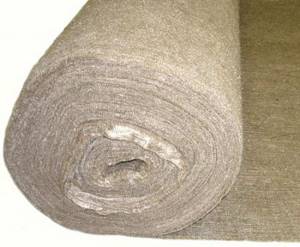
Mineral wool BASWOOL Standard
| Name of product | Density, kg/m3 | Plate geometry, mm. | Package | Loading norm for a truck with a volume of m3 | Price including VAT ₽/m3 | ||||||||||||||||||||
| length Width | thickness in 10 mm increments | Thickness/number of slabs per pack | Pack volume, m3 | Pallet volume, m3 / number of packs | |||||||||||||||||||||
| 92 | 120 | ||||||||||||||||||||||||
| BASWOOL Standard 50 thermal insulation of layered masonry | 50 | 1200 / 600 | 50-200 | 50 / 6 | 0.216 | 6.912 / 32 | 76.032 | 89.856 | 2520.00 | ||||||||||||||||
| 100 / 6 | 0.432 | ||||||||||||||||||||||||
| BASWOOL Standard 60 thermal insulation of layered masonry | 60 | 50 / 12 | 0.432 | 2700.00 | |||||||||||||||||||||
| 100 / 6 | 0.432 | ||||||||||||||||||||||||
| BASWOOL Standard 70 thermal insulation of layered masonry | 70 | 50 / 6 | 0.216 | On request | |||||||||||||||||||||
| 100 / 4 | 0.288 | ||||||||||||||||||||||||
Advantages and disadvantages
This building material can be used for facades and interior work.
Different sizes of insulation allow you to choose products of exactly the thickness that is necessary for the purpose of high-quality insulation.
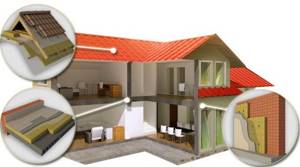
Application in various areas of insulation
- Non-flammability - it is completely fireproof.
- High level of sound insulation.
- Good vapor permeability.
- Environmentally friendly. During operation, such material will not cause harm to residents of the house that is insulated with it.
- The material does not rot and is also not susceptible to beetles and microbes.
- It has a long service life - 40 years.
- Easy to install.
- Has low water absorption. Since moisture has a detrimental effect on insulation, this factor is important.
- As with any mineral wool, contact with water is undesirable. Although this model is hygroscopic, it should still be protected from rain and high humidity. This means that when performing facade work, it is necessary to begin plastering the surface (for wet facades) as early as possible. For ventilation facades, the wool should be covered if rain is expected.
- When performing installation work, you must provide yourself with all the necessary personal protective equipment. You need to work in gloves, glasses, and a respirator. Clothes must have long sleeves.
What is Baswul?
Stone wool is made from basalt rocks. To obtain this fiber, raw materials are processed at temperatures above 1000°C. The individual parts are held together with organic resins. Basvul is produced at a modern plant in Blagoveshchensk near Ufa. The first batches of insulation were released in the summer of 2011.
This basalt wool is used in the processing of private buildings, outbuildings, as well as industrial institutions. The price is affordable, so even those who do not have the means to use expensive building materials can carry out thermal insulation work using this insulation.
Basalt insulation Baswool for roofing
The slabs may fall out of their seats under their own weight. They need to be further secured.
Basvul roofing basalt insulation, according to reviews, has proven itself well if all installation work was carried out according to technology. It is available in slabs:
- RUF;
- RUF N;
- RUF V;
- Light;
- Sandwich K.
Based on reviews that confirm the characteristics declared by the manufacturer, Baswool RUF insulation can be installed under a screed. This allows for a fairly high density of 120-140 kg/m. cube and compressive strength 60 kPa. Its main purpose is insulation in one layer, the thickness varies from 50 to 200 mm. Like any stone wool, it allows steam to pass through (at least 0.3 mg/m*h*Pa). At the same time, it almost does not absorb moisture, the value is only 1.5% per day, lambda 0.037-0.04 W/mK.
Baswool RUF N insulation, technical characteristics:
- density 100-120 kg/m. cube;
- compressive strength maximum 45 kPa;
- lambda 0.036-0.038 W/mK;
- does not burn.
The level of vapor permeability and water absorption is the same as that of the previous material. This insulation is used as the first layer of a thermal insulation cake. Material thickness from 40 to 200 mm. It can also be installed under a thin protective screed.
Basalt insulation Baswool RUF V is laid as a second layer on RUF N. The density of this material is 170-190 kg/m. cube, which makes it more resistant to mechanical stress. It is much stronger in compression than the bottom layer, this value is 80 kPa. The increased density is reflected in thermal conductivity, lambda is 0.038-0.041 W/mK. Thermal insulation thickness is from 30 to 50 mm.
Thermal insulation Basvul Light has a low density of 30 kg/m. cube Thanks to this, the thermal conductivity of the material is only 0.037 W/mK, which is quite good for stone wool. This material is more susceptible to moisture absorption (2% per day), so it must be protected with vapor barrier films or other materials that prevent air circulation. The material can also be used to insulate horizontal ceilings and walls.
Mineral wool Baswool Sandwich K is used for the production of roofing panels, where the insulation on both sides is covered with metal (tin). Density 140 kg/m. cube and a compressive strength of 110 kPa are enough to make the products strong. At the same time, this material cannot boast of low thermal conductivity, lambda 0.042-0.045 W/mK.
Mineral wool Baswool Ruf N
| Name of product | Density, kg/m3 | Plate geometry, mm. | Package | Loading norm for a truck with a volume of m3 | Price including VAT ₽/m3 | ||||||||||||||||||||
| length Width | thickness in 10 mm increments | Thickness/number of slabs per pack | Pack volume, m3 | Pallet volume, m3 / number of packs | |||||||||||||||||||||
| 92 | 120 | ||||||||||||||||||||||||
| BASWOOL RUF N 100 bottom layer of flat roof thermal insulation | 100 | 1200 / 600 | 50-160 | 50 / 6 | 0.216 | 6.912 / 32 | 76.032 | 89.856 | 4100.00 | ||||||||||||||||
| 100 / 3 | |||||||||||||||||||||||||
| BASWOOL RUF N 110 bottom layer of flat roof thermal insulation | 110 | 50 / 6 | On request | ||||||||||||||||||||||
| 100 / 3 | |||||||||||||||||||||||||
| BASWOOL RUF N 120 bottom layer of flat roof thermal insulation | 120 | 50 / 6 | On request | ||||||||||||||||||||||
| 100 / 3 | |||||||||||||||||||||||||
Technical characteristics of Baswool basalt wool
- High strength: this quality is due to the source material (stone) for the production of stone wool, and allows the use of this thermal insulation in any building structures. Despite its high strength, Basvul basalt wool is easy to cut, which speeds up and simplifies all work.
- Fire resistance: high resistance to fire and elevated temperatures.
- Thermal insulation: reliably insulates rooms from thermal influences, guaranteeing high energy saving rates.
- Noise insulation: creates comfortable indoor conditions due to a special fibrous structure with a chaotic arrangement of fibers.
- Good vapor permeability: effectively removes moisture from building structures and maintains an optimal indoor microclimate.
- High moisture-repellent qualities: mineral wool is ideally hydrophobic and is not affected by living organisms, as it is made from a material not suitable for their habitat and nutrition.
- Elasticity, plasticity and resistance to mechanical stress, therefore it is used when carrying out work of any level of complexity.
Baswool basalt wool fills the entire insulated space without the formation of cold bridges due to the large number of air capsules (a kind of mini-thermoses) in its structure, located between the fibers of the material. Dimensions and shape are maintained over a long service life.
The Baurex company is the official dealer of the Baswool plant, so you can buy basalt wool from us cheaper than in other stores.
Related Posts
- Isover thermal insulation overview
- The best stone wool insulation - a review of manufacturers and brands
- Mineral wool, its characteristics and insulation composition
- Izovol
- Choosing non-flammable insulation for walls and ceilings: tips and tricks
- Subtleties of attic floor insulation
- Foil insulation: types, properties and possibilities of use
- Ecover insulation: pros and cons
- Insulating the attic from the inside if the roof is already covered: step-by-step instructions
- Technolight
- Types of roll insulation and the distinctive features of each of them. roll insulation for walls: choosing the best thermal insulation special thermal insulation coating
- Properties and types of dowel mushrooms for fastening insulation
- TechnoNIKOL
- Insulation of a veranda in a wooden house
- Thermal insulation pierced mineral wool mats: material properties
- What's better
- Aluminum foil for bath insulation
- Choosing insulation for a frame house
- Insulation of a house made of 150x150 timber from the outside
- How to properly insulate a wooden house with mineral wool
- Ecowool as insulation: pros and cons
- Insulation of facades. insulation for exterior walls of a house
- Insulating the attic with foam plastic
- Hydro-vapor barrier “isospan b”. characteristics and instructions where and how to use insulating material
- Insulation of a concrete floor in an apartment
Read with this
- Isover thermal insulation overview
- The best stone wool insulation - a review of manufacturers and brands
- Mineral wool, its characteristics and insulation composition
- Izovol
- Choosing non-flammable insulation for walls and ceilings: tips and tricks
- Subtleties of attic floor insulation
- Foil insulation: types, properties and possibilities of use
- Ecover insulation: pros and cons
- Insulating the attic from the inside if the roof is already covered: step-by-step instructions
- Technolight
